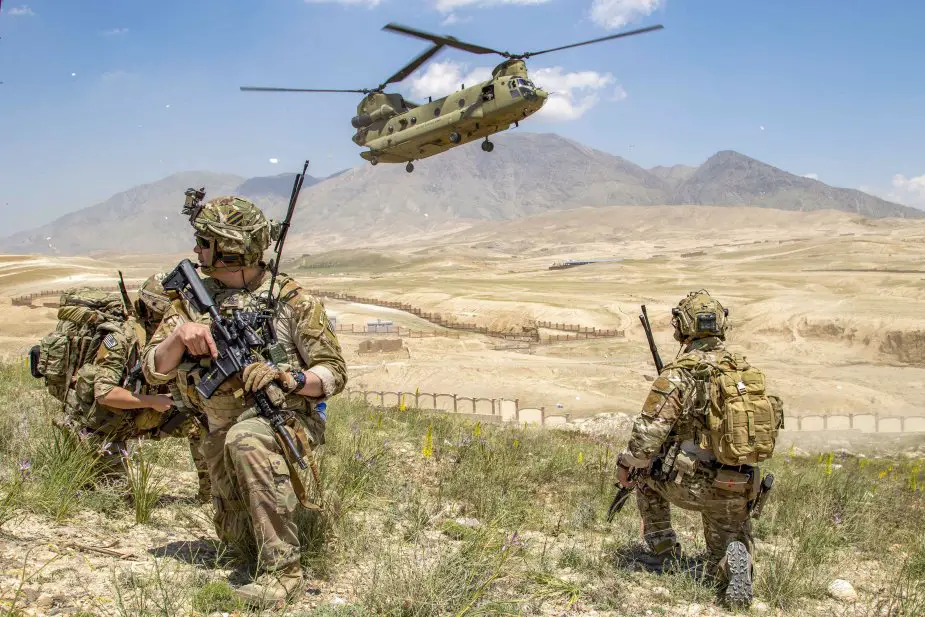Breaking news
U.S. National Guard brigade recounts successes in Afghanistan.
Lt. Col. Matt Johnston and Sgt. 1st Class Nicholas Nigro noticed a stark difference in the Afghan national defense forces this time around. Joe Lacdan reports on U.S. Army’s website.

Soldiers from 1st Bn, 121st Inf Regt of the 48th Inf Bde Combat Team, provide security as a CH-47 Chinook helicopter lands after a key leader engagement in Southeastern Afghanistan. The 48th Inf Bde Combat Team deployed to Afghanistan earlier this year in support of Operation Freedom's Sentinel (Picture source: U.S. Army/Master Sgt. Casey Nelsen)
During the height of the Afghan surge in 2009-2010, Johnston served as a company commander when the 48th IBCT of the Georgia National Guard deployed its entire force. About half of the 48th returned to Afghanistan this year to provide infantry support to an Afghan special operations task force from January to September.
Johnston, a brigade operations officer during the 2019 deployment, and Nigro, a platoon sergeant, said they saw a more organized, capable force in the U.S. ally this time. "The Afghan national forces are in the lead now," said Johnston, who spoke at a Pentagon press briefing Wednesday. "Whereas in 2009-2010 we may have led the patrols. We supported them on this deployment. That's a major difference. They're planning their own operations, coming up with their own timelines, their own maneuvers… We're supporting them in an advisory role," he said.
About 20% of the soldiers from 2009-2010 remained with the IBCT and deployed again. This time the junior soldiers and officers were now experienced NCOs and field-grade officers. This time, the 48th IBCT deployed in support of Operation Freedom's Sentinel and the NATO-led Operational Resolute Support.
The 48th Soldiers provided mission command operations. IBCT elements acted in a training, advise and assist role with Afghan soldiers and supported security operations throughout the nation. The unit provided a fire battalion to add indirect fire support at various locations and a field artillery headquarters to serve the whole region.
About 1,600 of the 48th Infantry Brigade Combat team returned to the U.S. in July and another 400-500 followed in September. With one-third of the unit associated or working in law enforcement, the 48th IBCT Soldiers had unique qualifications to counsel and assist Afghan forces. During the U.S operation Guardian Angel, American forces formed the mission as a risk mitigation measure to counter potential insider attacks.
The 48th IBCT depended on Soldiers' intuitive abilities to assess potential threats, said Col. Matthew D. Smith, 48th IBCT commander. "If you consider the environment that law enforcement officers work in, they have thousands of human contacts," Smith said. "Much more than most of us do on any given day. That serves as training; it gives you a sample size of how people react in certain situations. That carries over to the battlefield."
During the deployment early last summer, tragedy struck. Johnson said U.S. intelligence reports pointed to a possible assassination attempt of a brigade commander. An Afghan brigade commander died in the attack. However, not a single U.S. soldier sustained an injury. Smith credited the unit's preparation and training with helping prevent any U.S. casualties. "Obviously, the death of a partner is tragic on many levels," Smith said. "But it was somewhat counter-intuitively a high point for Sgt. Nigro's platoon that they handled it so well."
After the nine-month deployment, the unit awarded 14 purple hearts to soldiers who suffered gunshot wounds or shrapnel or concussive injuries.
Smith credited the unit's alignment with the 3rd Infantry Division in the two years leading up to the deployment and relationships formed with the division's leadership. When the 48th IBCT replaced the 1st Brigade, 4th Infantry Division, that familiarity helped pave a smooth transition. "My guys were still ready to perform because we continued to train in our off time," Nigro said. "All the training we did throughout our deployment allowed us to be ready, flexible and effective at the end."

























